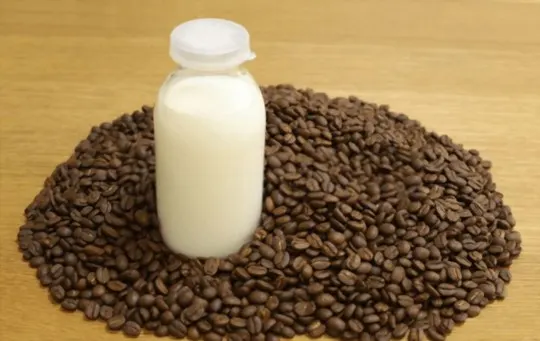Struggling to find a coffee substitute that retains the rich taste of your morning pick-me-up? You’re not alone.
We reveal the five best options available right now, including chicory coffee.
Discover how to give your cup of Joe a delicious twist without sacrificing flavor.
What’s Chicory Coffee?

Chicory coffee is a blend of coffee and chicory root that has been used for generations.
Not only does it provide an earthy taste, but its slightly sweet flavor makes it an appealing addition to many coffee-based drinks.
Chicory is also a robusta type of coffee, meaning it has more caffeine than most arabica breed coffees.
If you are interested in trying chicory coffee but don’t want the caffeine kick, there are several substitutes available.
Chicory is a plant that grows in the northern hemisphere and has been used as a medicinal herb throughout Europe and southeast Asia since ancient times.
The root of the plant is used to make chicory flour or ground into powder, similar to regular coffee.
Unlike regular Coffee, chicory has milder tastes and is lower in caffeine, making it an ideal choice for people who prefer decaffeinated drinks or just don’t want all the side effects of regular caffeinated drinks such as headaches and jitters.
Why do they put chicory in coffee?
Chicory is a natural herb that has been used for centuries to add flavor and aroma to drinks like tea and coffee.
The leaves of the chicory plant can be dried, toasted, and ground up into a powder-like substance that is then added to drinks as an ingredient blend.
When included in coffee mixtures, chicory provides roasted caramel-like hints with a slightly bitter finish.
It’s used in many countries around the world as a healthier alternative to coffee or as an alternative caffeine source when increasing caffeine consumption is not desirable.
With its unique taste and properties, chicory can be especially helpful in preventing indigestion or digestive issues that accompany extreme caffeine consumption.
It’s also known for its mild laxative properties which reduces bloating and cramps sometimes caused by traditional coffee drinking.
However, if you don’t want the taste of chicory in your morning brew there are several good alternatives that can provide you with similar health benefits without impacting your cup of joe’s flavor profile.
5 Best Chicory Coffee (Caffeine-Free) Substitutes to Consider
Chicory can be brewed just like regular coffee and can be taken black or with cream or sugar if desired.
Those who have tried both find that the taste of chicory is very similar to regular coffee, although it isn’t quite as full bodied or robustly flavored.
Here are 5 substitutes containing chicory that are worth exploring:
1 – Carob Coffee

Carob coffee is a delicious and unique alternative to traditional coffee.
Many describe it as having a sweet, nutty flavor.
Carob comes from the pulp of legumes, which are similar to beans but are not the same variety.
The seeds of these legumes are processed into the powder that can be used to make carob coffee.
It has a dark color and rich flavor profile that is sometimes compared to chocolate or espresso.
It contains significantly less caffeine than regular coffee and is naturally decaffeinated, making it a great choice for those looking for a less intense beverage.
Carob also contains several nutrients such as minerals, vitamins, fiber, and antioxidants which may have beneficial health effects like aiding in digestion, reducing cholesterol and helping with weight loss.
Carob coffee is easy to make at home but can also be purchased pre-made from certain specialty stores or online retailers.
2 – Dandelion Root Coffee

If you’re looking for a substitute that’s actually good for you, look no further than dandelion root coffee.
Dandelion root has been consumed as a natural health remedy for centuries and has been used as an herbal tea or to flavor traditional roasted coffee for much of that time.
Dandelion root grounds have a slightly earthy, nutty flavor with naturally sweet undertones.
Best of all, it’s naturally caffeine-free.
Some people find the earthiness and bitterness of roasted dandelion root too strong on its own, or even slightly medicinal in taste.
You can counter this effect by blending it with roasted chicory (which is itself a mildly bitter and woody tasting drink).
To make this combo, just mix equal parts of dandelion root and chicory ground coffees.
If you want to cut down even further on the bitterness, add ½ – 1 teaspoon each of sugar and cream in the mix while brewing your cup – the results will be deliciously aromatic with full body and a hint of sweetness.
3 – Roasted Grain Coffee

Roasted grain drinks, also known as grains coffee or malt coffee, often contain barley, rye, and oats that have been roasted and ground.
If you’re trying to find a coffee substitute that is caffeine free but retains a natural coffee flavor, roasted grain drinks are worth a try.
These drinks are traditional in many European countries.
In fact, they’re even served in airline flights sometimes.
Brewing instructions call for 1 tablespoon of roasted grain blend to be mixed with 1 cup of hot water and simmer for 3-5 minutes until you get your desired strength.
Additionally, it contains prebiotics which is essential for gut hydration.
Roasted grain drinks are slightly sweet and can be enjoyed with sugar, honey or your favorite flavoring agent like cocoa powder or syrups just like regular brewed coffees.
You can even add milk or cream if you prefer it creamy.
Try adding cinnamon or cardamom to enhance the flavor too.
4 – Roasted Soybean Coffee

Roasted Soybean Coffee is derived from roasted soybeans and makes a great substitute for those looking for the richness of coffee without the caffeine.
This high-protein alternative can have a surprisingly good flavor that many find accommodating.
It’s important to note, however, because of the soy content that this beverage may not be an ideal choice for individuals with allergies or sensitivities to soy.
Roasted Soybean Coffee has a light flavor that can easily be enjoyed black, but can take on more complex flavors if you decide to add any additional ingredients.
5 – Herbal Coffee

Herbal coffee is an ideal substitute for chicory coffee if you’re looking for a caffeine-free option with a similar flavor.
Herbal coffee is made of roasted grains, such as barley, rye and chicory root.
It has a full-bodied flavor and aroma similar to traditional coffee, but without any of the caffeine.
Find herbal coffees in both flavored and unflavored varieties to suit your tastes.
Popular blends include combinations of roasted barley, rye, chicory root, dandelion root and figwort root.
Conclusion
There are a variety of flavorful coffee substitutes available in the market today that can be used to create incredibly delicious cup of coffee.
Chicory coffee is one of those substitutes, offering a deep, dark flavor and unique bitter edge that can be quite tasty when blended with your favorite coffee bean.
Though there is no one-size-fits-all solution for replacing chicory coffee, each of these options offers its own unique benefits and characteristics that change the way you consume your morning cup.
Whether you are looking for something naturally gluten free, low in acidity or high in antioxidants, there’s an irresistible alternative available for all palates.
So don’t hesitate- try something new.
Taste test different options to find the best substitute for your daily cup.
Each of these types has their own special properties and offers something different from traditional coffee beans- so find the flavor combination that suits you best.

5 Best Chicory Coffee (Caffeine-Free) Substitutes to Consider
Ingredients
- 1 – Carob Coffee
- 2 – Dandelion Root Coffee
- 3 – Roasted Grain Coffee
- 4 – Roasted Soybean Coffee
- 5 – Herbal Coffee
Instructions
- Choose your preferred substitute from the list of options.
- Organize all of your ingredients.
- Use the proper substitute to cook your recipes.

Carrie is a food writer and editor with more than 15 years of experience. She has worked for some of the biggest names in the food industry, including Bon Appétit, Food & Wine, and Martha Stewart Living.
As the Editor in Chief of IntroChicago.com, Carrie oversees all of the content on the site. She also manages the team of contributing writers and editors, who help to create delicious recipes, helpful tips, and informative articles that you’ll find on the site.
A native of the Chicago area, Carrie is passionate about all things food. She loves trying new restaurants and experimenting with new recipes in her kitchen. She’s also a graduate of the Culinary Institute of America, so she knows a thing or two about food!
